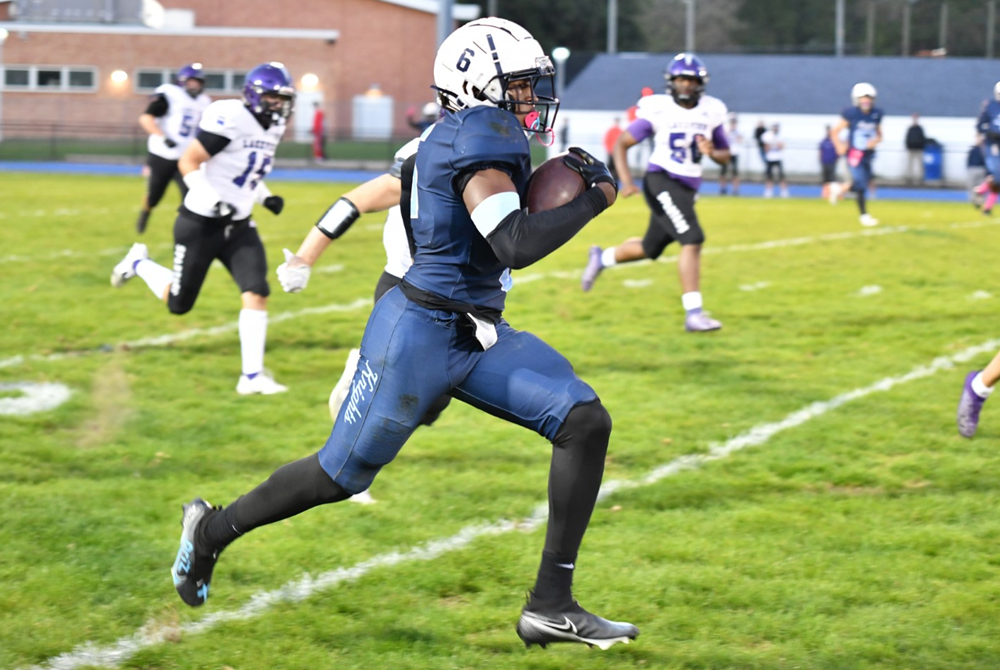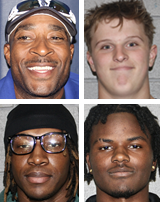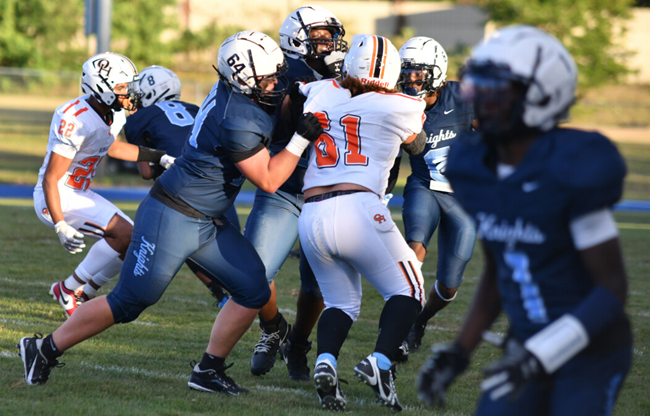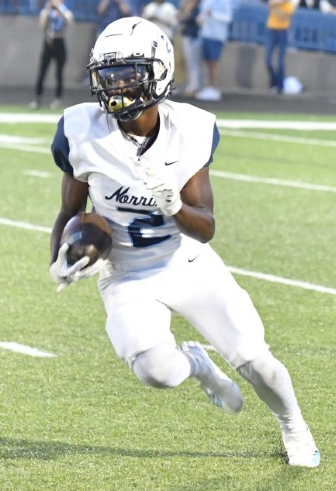
Writer-Turned-Coach Enjoys Debut
November 3, 2016
By Dennis Grall
Special for Second Half
ESCANABA — Sam Eggleston has seen high school football from two drastically different viewpoints. Now, even though he is an unpaid volunteer, he enjoys being on the sideline as a coach.
 Eggleston just completed his first season as a high school head coach, with Eben Superior Central winning its final three games to finish 4-5 in 8-player football. The Cougars were among the first teams in the state to join the 8-player format in 2010, their first year of football.
Eggleston just completed his first season as a high school head coach, with Eben Superior Central winning its final three games to finish 4-5 in 8-player football. The Cougars were among the first teams in the state to join the 8-player format in 2010, their first year of football.
Eggleston was a sportswriter before becoming a coach, giving him different perspectives to watching the same event.
The 1998 Rock Mid Peninsula High School graduate worked at newspapers in Escanaba, Kenai, Alaska; Northville and Novi, and Marquette before becoming a freelance writer and website blog editor in 2008. He started the writing phase of his career in 2000 with the Daily Press in Escanaba, under my direction.
He served as a volunteer assistant football coach in Northville, then moved back to the Upper Peninsula and became a volunteer coach at his alma mater in 2011 when the Wolverines went to 8-player football. He joined Superior Central in 2014 and spent two seasons as a volunteer aide until landing the head job just two weeks before the 2016 preseason began.
“In both careers … you took a shot on me and I ran with it, and the same with coaching; they gave me a shot and I’ve run with it as best I can,” he said.
In addition to his unpaid position at Superior Central, in rural Alger County, Eggleston is responsible for fundraising for the self-funded football program, a major priority for his offseason.
“My coaching is over (for the season) now and the majority of my time will be spent on raising funds so we can get new helmets, get new pads to replace ones that are broke, spending money we don’t have so we’ve got to make that up now,” he said. “We have to win now to have successful fundraisers.”
As a sportswriter, Eggleston would simply switch gears and move on to coverage of the next athletic season, for instance once fall sports moved into winter. He also never had to worry about how coaches managed off-field X’s and O’s once their seasons concluded.
Life was totally different as a reporter. “I had a different approach, different viewpoint, different mindset to a game as a writer,” said Eggleston, who still has the heft of when he was a lineman but now looks like a lumberjack with his bushy beard and build.
“Now I have to worry about every kid and every position,” he said. “Sometimes I don’t even see the end result of the play because I’m watching the line play. I don’t even know how well my running back did until I see where they moved the stick.”
He may also be working on an injured player while the game goes on, trying to make play calls and other decisions at the same time.
As a sportswriter, he would be jotting down notes between plays or perhaps checking the result of a picture he took of the previous snap, totally unaware the coach was monitoring several assignments.
“I look back at the writer I was and as a coach now, and I would hate the type of writer I was,” he said.
Eggleston would analyze why a coach would switch to running a sweep rather than the counter that had been working, all while the coach may be working on an injured player that caused a change in offensive plans.
“As a writer I never had the insight to see everything. I just saw the overall game and kept track of every yard,” he said. “As a coach I can’t even tell if the play went five yards because I have three plays stacked up as the game goes on.”
While he was writing sports in the metro Detroit area, his weekly paper often covered games also being covered by the Detroit Free Press or the Oakland Press, with those stories appearing the next day. Eggleston’s story would appear maybe five days later, after everyone knew what happened.
 “I had to come in with a different angle. I tried to be a little more analytical and focus on strategy versus the flourish and try to get the meat of the game rather than get to the flowery parts,” he recalled. “I tried to take a different approach and make my stuff more interesting.”
“I had to come in with a different angle. I tried to be a little more analytical and focus on strategy versus the flourish and try to get the meat of the game rather than get to the flowery parts,” he recalled. “I tried to take a different approach and make my stuff more interesting.”
His style apparently worked as the paper received several journalism awards and subscriptions remained strong.
Writing also provided some interesting backdrops. He had to use small charter planes to see some games in Alaska, or get to Nome to handle features about the Iditarod sled dog race.
He recalls covering a high school hockey game on an outdoor rink in Alaska and said “it was the first time I saw wind shear affect a hockey game.”
Eggleston also covered a football game where a kicker booted the ball off the uprights, then off a fence, and it bounced into the ocean in Homer.
He reported on a murder trial at that paper, where he would work the news desk in the morning, take time off and then handle sports at night. “It was super stressful,” he said.
Now walking the sidelines as a coach, he said “it definitely does feel like I’ve seen both sides of the coin, and I understand both sides of them better.”
He remembers just giving “little more rounded answers and (to) give both sides of the story” in postgame interviews. “A lot of coaches give canned answers. I try to be a little more in-depth and help try to write the story.”
In his early days as a sportswriter, he said “I would see the game unfold and see the pressures and why a coach would make a decision to go for it (on fourth down). I was a bit more critical of the coach and their decision,” he said, adding “I would probably have been a little more biting about it when I wrote the story.”
He admits in those days “I thought I knew everything there was to know about football. I played it,” he said. “I always approached the game like I was the professional and knew everything about the game. Now as a coach there are a host of responsibilities during every game. I am in completely different waters now. The hardest thing is keeping the kids pointed in the right direction as things go wrong.
“You’ve got the entire team and you’ve got to keep moving in a positive direction, keep the focus going forward. Forget the last play and work on the next one and get the kids to buy into that philosophy.”
He also compares his first writing assignment at the Daily Press with his first game this season at Ontonagon. “I did a (men’s baseball) story about the Escanaba Polecats, and you read my first line and said, ‘Did Yoda write this?’ I thought, oh my God, I don’t know what I’m doing.”
The Cougars lost their opener this fall 36-8, and Eggleston said “after being an assistant for four years, I still wasn’t prepared going into that Ontonagon game. We lost, and as I look back, if we played them right now I think we would beat them.
“I had no clue coming into that first game and didn’t have any idea how to get us back on track.”
He eventually figured enough out to finish 4-5 and found plenty of ways to enjoy being a coach.
Eggleston tries to eat lunch with his players every day, and he pays for his own meal.
“I want a family environment there; we all sit at the same table,” he said. “What I get back is relationships I never had before. I feel like I have 21 kids, and I love every minute of it.”
 Denny Grall retired in 2012 after 39 years at the Escanaba Daily Press and four at the Green Bay Press-Gazette, plus 15 months for WLST radio in Escanaba; he served as the Daily Press sports editor from 1970-80 and again from 1984-2012. Grall was inducted into the Upper Peninsula Sports Hall of Fame in 2002 and serves as its executive secretary. E-mail him at [email protected] with story ideas for the Upper Peninsula.
Denny Grall retired in 2012 after 39 years at the Escanaba Daily Press and four at the Green Bay Press-Gazette, plus 15 months for WLST radio in Escanaba; he served as the Daily Press sports editor from 1970-80 and again from 1984-2012. Grall was inducted into the Upper Peninsula Sports Hall of Fame in 2002 and serves as its executive secretary. E-mail him at [email protected] with story ideas for the Upper Peninsula.
PHOTOS: (Top) Eben Junction Superior Central football coach Sam Eggleston speaks with some of his players during a game this season. (Middle) Eggleston monitors the action on the field. (Photos by Dennis Grall.)

Struggle Transforming Into Success as Loy Norrix Builds Best Season since 1990s
By
Pam Shebest
Special for MHSAA.com
October 22, 2024
KALAMAZOO — Over Lorenzo Robertson’s first three years as head coach, the Kalamazoo Loy Norrix football team won a total of three games.
 His patience and guidance have paid off this year, leading to the Knights' first five-win season since 1998.
His patience and guidance have paid off this year, leading to the Knights' first five-win season since 1998.
A win against crosstown Southwest Michigan Athletic Conference East foe Kalamazoo Central in Friday’s regular-season finale would clinch an outright league championship for the Knights and potentially provide enough boost to get them back into the MHSAA Playoffs for the second time in school history – and first since 1997, when Loy Norrix featured future pros (Todd) T.J. Duckett and Little John Flowers.
Both Loy Norrix and Kalamazoo Central are 5-3 overall and 3-0 in SMAC East play heading into this weekend. The Knights finished 1-7 a year ago and entering this fall had won a combined 10 games over the last 12 – but they’ve guaranteed their first winning regular season in 26 years.
“We turned it around with a new commitment to the classroom,” Robertson said. “A lot of our kids are (now academically) eligible whereas when I got here, a lot of our kids struggled to keep the lower levels eligible. Those kids are now seniors, and they’re all doing well.”
Robertson said when he was hired, athletic director Andrew Laboe told him one of the key focuses was to get the players stronger.
When the new coach realized there was no weight training program, he started one.
“Where I come from (Bloomfield Hills Lahser, Pontiac and Dearborn Heights Robichaud), weights were very important to the point that we had a class for it during the school day for the football team and those that wanted to take the class that weren’t football,” Robertson said.
 Robertson also implemented offseason training, and during the second summer camp this year he realized this could be the turnaround season.
Robertson also implemented offseason training, and during the second summer camp this year he realized this could be the turnaround season.
“I knew the boys were getting it quickly, and we were able to move fast through the summer,” he said. “Because they had it down through the summer, when the season started, we hit the ground running.
“During our scrimmages, we were miles ahead of the teams we scrimmaged, though they were good teams. I could tell we were ready to go; we were moving fast. I knew that would carry over, just watching them in the summertime.”
Robertson also makes sure the players know the team’s history.
“Our coaches do a good job of researching,” he said. “Every team we play, we give (players) stats on when was the last time we beat ’em, how many times through the years, what’s our record down through the years. We teach these kids history of the Norrix program before we play.”
Before Robertson, things got so bad that in 2020 the football team, struggling to field players, left the SMAC and played as an independent.
This year, after four seasons away, the Knights are back in the conference.
“After our first SMAC game (we felt more competitive) because people were saying you won’t survive in the SMAC – and we come to the SMAC and it’s our best year,” said senior wide receiver/safety Rashad Waller. “That was really when I knew, oh yeah, I know this is it.”
A four-year varsity player, Waller said he stuck it out through the lean seasons because he knew things were bound to improve.
As a freshman, “watching behind the older guys and realizing they don’t have the time (to improve), I don’t want to be that guy,” he said. “I had to make my team lock in.
“Everybody in my class was tired of losing, so we just locked in and got it done. Coaching got a lot better, and guys really wanted it bad and made it happen.”
Waller already owns two school records. He returned two kickoffs for touchdowns to set a single-game record Sept. 20 against Mattawan. Both TD returns went for 99 yards, another all-time Norrix best and long enough to tie the MHSAA 11-player record for kickoff return distance as well.
Another senior, left guard/defensive tackle Will Dominianni, also weathered the previous three dismal varsity years.
 “We were a young program with a new head coach, so all of us kind of grew into our roles when it comes to the coaching staff and players as well,” he said. “That was a big thing.
“We were a young program with a new head coach, so all of us kind of grew into our roles when it comes to the coaching staff and players as well,” he said. “That was a big thing.
“We’ve really become a tight-knit group over the past couple years with all of us freshmen getting moved up on varsity our freshman year, so it was a bit like baptism by fire. We’ve all embraced the struggle together.”
Dominianni is one of the team’s rotating captains.
“Will Dominianni has probably been captain most of the year,” Robertson said. “David Jones is also having a great season.”
Jones, a junior running back/safety, is a second-year varsity player.
“The new guys we have are more dedicated (than previous years),” he said. “We’re coming together as a team. I knew it could change, and it did.”
Robertson said the success is a total team effort.
“We have a three-headed monster, sometimes a four-headed monster, at running back with David Jones, Maddox Pirochta, Christian Euceda. They have great per-carry averages.
“Whenever we get in trouble, we can give the ball to any of those three. Our running backs coach (Kierre Stinnette) does a great job rotating them in games.”
Robertson also credited his new defensive coordinator, Damion West, brought up from the junior varsity. “We promote from within,” Robertson said. “He’s pitched a couple shutouts with our defense. That will always keep you in games.”
Robertson added that the offensive line also has been a big improvement.
“This could be the best line I’ve had since being here, and we’re young with only two seniors in that group,” he said.
The quarterback position is shared by senior Jalen Evans and junior Jonavan Hare.
Besides working with players, Robertson also is building a rapport with parents, another key to the program’s success.
“When I came here, there was no parent booster program,” he said. “I’ve always known a parent booster group anywhere I’ve coached.
“We started that from scratch, and since that’s got rolling with our first group of parents, all the way to now has grown. Volunteerism has grown, and I always think that’s key to growing programs.”
 He said he’s also thankful the administration stuck with him during the lean years.
He said he’s also thankful the administration stuck with him during the lean years.
“I think they saw the change in the boys through the years; that kept me here,” he said. “The boys are doing better in school, better citizens and that’s also important.
“Sometimes wins and losses are put on the back burner to what kind of young man you are bringing into the world. Football is such a life-teaching sport.”
Robertson is steeped in life-teaching skills.
A retired minister, he currently commutes to Detroit for his job as captain in the Detroit Fire Department.
“(The fire department job) helps me not take anything for granted with all the tragedy I see and everything else that goes on,” he said. “It helps me care on a personal level, on a human level, for the boys.
"They see a working man, they see somebody who’s a family man that’s dedicated to them. I’ve got common sense, no-nonsense and I think that’s what attracts them.”
Once those players are attracted to the program, Waller has some advice for them.
“A lot of the younger guys complain about playing time, but coach is watching, so just keep your head on and keep grinding,” he said. “You’re gonna get your chance. Other than that, don’t worry about all the offers and all that stuff. It will come eventually.
“The first two years just work on getting your body right, getting fast and keep your grades up – and it will be the best two years of your life.”
 Pam Shebest served as a sportswriter at the Kalamazoo Gazette from 1985-2009 after 11 years part-time with the Gazette while teaching French and English at White Pigeon High School. She can be reached at [email protected] with story ideas for Calhoun, Kalamazoo and Van Buren counties.
Pam Shebest served as a sportswriter at the Kalamazoo Gazette from 1985-2009 after 11 years part-time with the Gazette while teaching French and English at White Pigeon High School. She can be reached at [email protected] with story ideas for Calhoun, Kalamazoo and Van Buren counties.
PHOTOS (Top) Kalamazoo Loy Norrix’s David Jones (6) sprints down the sideline during a Week 6 win over Battle Creek Lakeview. (2) Clockwise from top left: Knights coach Lorenzo Robertson, Will Dominianni, Rashad Waller and Jones. (3) Dominianni (64) helps protect his backfield against Grand Rapids Ottawa Hills. (4) Waller gets to the edge against St. Joseph. (Action photos by Steve Andrie; headshots by Pam Shebest.)

